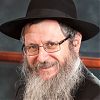A gentile seeking to convert to Judaism once approached the great sage Hillel and said: "Teach me the whole Torah while I stand on one foot." Hillel responded: "What is hateful to you do not do to others. This is the essence of Jewish teaching - the rest is the commentary which you must go and study."
The Tzemach Tzedek, a great Chasidic Rebbe explains that Hillel's response is not just about treating others well. Hillel was teaching us a fundamental lesson how to accept and tolerate everyone, even those individuals that are difficult to relate to and have annoying personalities.
Try the following experiment. Think of a weakness, a negative trait or fault that you acknowledge possessing. Now try and imagine what would happen if someone else criticized you by pointing out this very problem. Chances are that you would feel hurt, insulted and might even respond angrily. Why is there a difference between knowing your own failings and someone else pointing them out to you?
We all love ourselves. In a healthy person this love is not egocentric but rather a positive acceptance of ourselves and a recognition of our intrinsic value and worth. At the very essence of every human being, there is a Divine spark of infinite goodness and purity, which is totally independent of one's strengths and weaknesses. It is this pure soul that creates our essential identity. Being aware of it allows us to recognize our faults on a cognitive level without affecting us emotionally. We take responsibility for our deficits, but we don't define ourselves by them. We work on improving ourselves all the time, but we accept ourselves the way we are now
However, when someone else points out the very same failing we don't feel that same love and acceptance. We feel judged and put down. We feel that we are being defined by our faults and we react with emotional pain.
Hillel taught us that what we don't like done to ourselves we shouldn't do to others. We don't have to be naïve and believe that everyone is perfect. We don't have to be blind to the failings of others. But we do have to see them as we would like to be seen. We cannot judge others and define them by their failings. We have to learn to accept the 'whole person', love them and recognize their infinite value and intrinsic worth.
If we can accept others and ensure that their negative traits don't affect us, G-d will do the same for us. He knows everyone's dark side better than anyone. He wants us to improve all the time. But He still accepts us unconditionally and loves us the way we are.
NOT NAIVE JUST LOVING

 Rabbi Michoel Gourarie
Rabbi Michoel Gourarie